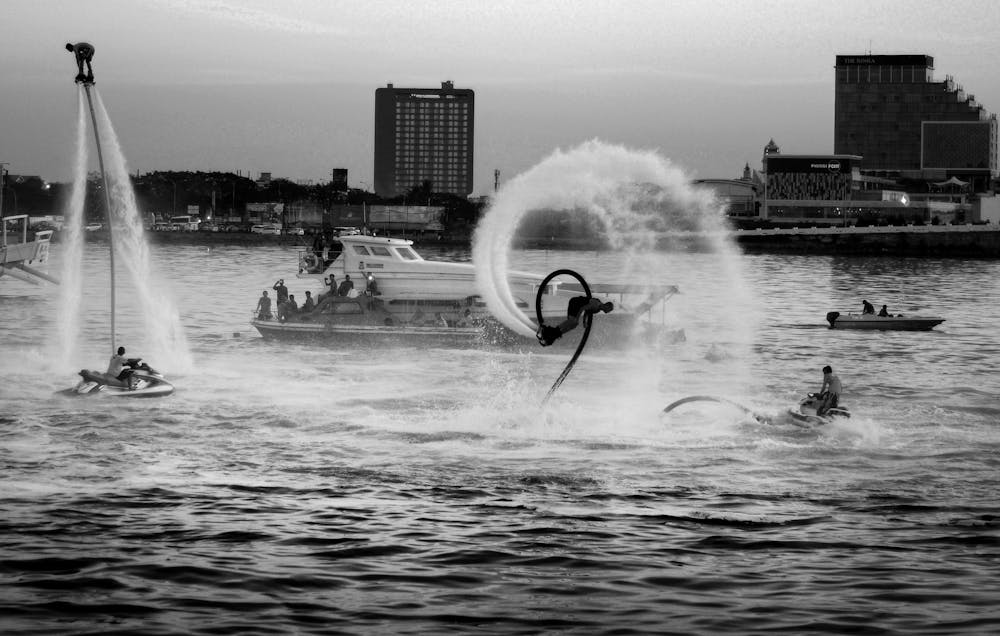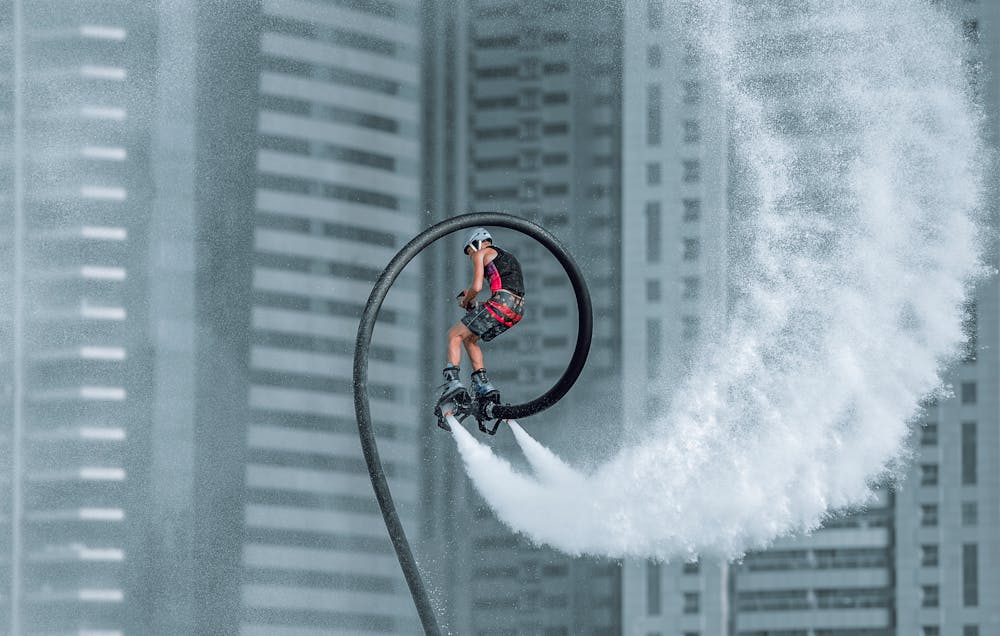A flyboard instructor is a professional who is trained to teach individuals how to use a flyboard, a water-powered jetpack that propels users into the air above a body of water.

This exhilarating activity has gained popularity in recent years, with many people eager to experience the thrill of soaring above the water like a superhero.
Safety and enjoyment in a Flyboard Training
Flyboard instructors play a crucial role in ensuring the safety and enjoyment of their students, guiding them through the process of learning how to use the equipment properly and execute impressive aerial maneuvers.
One of the key responsibilities of a flyboard instructor is to provide thorough instruction on how to operate the flyboard safely and effectively.
They must have a keen understanding of the equipment and be able to communicate instructions clearly to students of all skill levels.
Beginners and experienced
In addition to teaching basic maneuvers, such as hovering and turning, instructors may also offer more advanced training in tricks and stunts for experienced flyboarders.
In the upcoming sections of this article, we will explore the essential skills and qualities that make a successful flyboard instructor, as well as the unique challenges and rewards of working in this exciting field.
What you should know
1. Flyboard instructors have a unique and exciting job that involves teaching clients how to ride a water-powered jetpack, providing thrills in a safe environment.
2. Safety is a top priority for flyboard instructors, who must ensure that all clients receive thorough instructions on how to operate the flyboard and follow all safety protocols.
3. Flyboard instructors must have excellent communication skills to effectively teach and guide clients through their flyboarding experience, fostering a positive and enjoyable atmosphere.
4. This job offers the opportunity to work in beautiful locations around the world, such as tropical beaches and luxury resorts, providing a stunning backdrop for lessons.
5. Flyboard instructors love their job for the adrenaline rush, the satisfaction of seeing clients succeed, and the chance to share their passion for flyboarding with others.
What does a typical day look like for a Flyboard Instructor?
A typical day for a Flyboard Instructor is filled with excitement, adrenaline, and a lot of time spent on the water.
The day usually starts early in the morning as they prepare their equipment and check the weather conditions for the day.
Once everything is set, they head out to the water where they will spend most of their day teaching and guiding clients on how to use the Flyboard.
Training and Preparation
Before starting their day, Flyboard Instructors need to ensure that all their equipment is in top condition.
This includes checking the Flyboard itself, the safety gear, and the jet ski that powers the Flyboard.
They also need to review their lesson plans and make any necessary adjustments based on the skill level of their clients for the day.
Additionally, Flyboard Instructors need to stay up-to-date on the latest safety protocols and techniques in order to provide a safe and enjoyable experience for their clients.
This may involve attending training sessions or workshops to improve their skills and knowledge.
One tip for Flyboard Instructors is to always prioritize safety above all else.
This means ensuring that all clients are properly fitted with safety gear, providing clear instructions on how to use the Flyboard, and closely monitoring clients while they are in the water.
Client Interaction and Instruction
Once out on the water, Flyboard Instructors spend the majority of their day interacting with clients and providing instruction on how to use the Flyboard.
This may involve demonstrating proper techniques, giving feedback on clients’ performance, and offering encouragement and support throughout the lesson.
Effective communication skills are essential for Flyboard Instructors in order to clearly convey instructions and ensure that clients feel comfortable and confident while using the Flyboard.
They must also be patient and understanding, especially when working with clients who may be new to the sport or feeling nervous about trying it for the first time.
One alternative for Flyboard Instructors is to offer group lessons or team-building activities for corporate clients or special events.
This can provide a unique and memorable experience for participants while also allowing the instructor to work with larger groups at once.
Maintenance and Clean-Up
After a long day on the water, Flyboard Instructors need to take the time to clean and maintain their equipment to ensure it is ready for the next day.
This may involve rinsing off the Flyboard, checking for any damage or wear and tear, and properly storing all gear in a safe and secure location.
It is important for Flyboard Instructors to properly care for their equipment in order to prolong its lifespan and prevent any accidents or malfunctions while in use.
Regular maintenance and inspections can help identify any issues early on and prevent them from becoming more serious down the line.
One type of maintenance tip for Flyboard Instructors is to regularly inspect the hose and connections on the jet ski to ensure they are secure and free from any damage.
This can help prevent any leaks or malfunctions while out on the water and keep both the instructor and clients safe during the lesson.
What is a typical day like for a flyboard instructor?
A typical day for a flyboard instructor starts early in the morning, preparing the equipment and checking the weather conditions for the day.
Once everything is set up, the instructor will meet with clients and provide a safety briefing before getting them suited up in the necessary gear.
Throughout the day, the instructor will guide clients through the basics of flyboarding, helping them get comfortable with the equipment and teaching them different maneuvers and tricks.
The day is usually filled with excitement and adrenaline as clients experience the thrill of flying above the water.
What skills are required to become a flyboard instructor?
To become a flyboard instructor, one must have a strong background in water sports and be a proficient swimmer.

It is also important to have excellent communication skills and be able to effectively teach and guide clients through the flyboarding experience.
Additionally, a flyboard instructor must have a good understanding of safety protocols and be able to quickly assess and respond to any potential risks or emergencies that may arise during a session.
Overall, a successful flyboard instructor is someone who is passionate about water sports, enjoys working with people, and is dedicated to providing a fun and safe experience for their clients.
FAQs
1. How do you ensure safety during Flyboard sessions?
Safety is paramount: Our instructors are trained to ensure the safety of all riders.
We provide detailed safety briefings before each session, and riders are required to follow all instructions carefully.
We also have a strict code of conduct and enforce safety rules at all times.
2. What kind of training do you receive as a Flyboard instructor?
Certified Instructors: All our Flyboard instructors are certified by ZR, ensuring they have the necessary skills and knowledge to teach and guide riders safely.
We also provide ongoing training and support to maintain our high standards.
3. How do you handle riders who are not comfortable or struggling during a session?
Instructor Discretion: Our instructors have the discretion to stop a session if they feel the rider or others in the group are putting themselves in danger.
In such cases, no refund is given if the session is stopped due to reckless behavior.
4. How do you handle riders who are late or miss their scheduled session?
Timing is Crucial: Riders are required to arrive 10-15 minutes prior to their scheduled session for a short intro lesson and life jacket/helmet fitting.
If they are late, they will forfeit their flight time and no refund will be given.
5. How do you handle riders who are not meeting the requirements for Flyboarding?
Exclusions: Certain individuals, such as minors, people with injuries or medical conditions, and those who do not speak English as a first language, are excluded from the “Fly or It’s Free Guarantee.”
These riders will not be refunded if they are unable to participate.